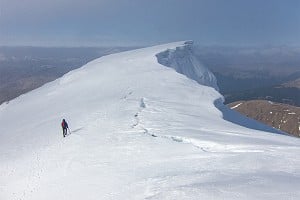
Andy Kirkpatrick has spent over 200 nights on El Capitan and has soloed big-wall routes which most people would find daunting enough to take on as a team. What makes this man tick? Is he a climbing 'psycho' - to reference his autobiographical first book Psycho Vertical, which interweaves stories from Andy's upbringing with passages from his solo ascent of Reticent Wall in 2001, an A5 aid climb on El Capitan.
The book is potentially being adapted into a film this year, if sufficient funds are amassed through a Kickstarter campaign. On the back of this, filmmaker Jen Randall asked Andy a few questions about the psychological side of soloing 3,000ft big-walls...
You’ve climbed El Capitan many, many times. What made you want to do it alone? Isn’t it just way harder? Is that the point?
I have a fault inside me that undermines a lot of what I do, the thing that I have to compensate for by over reaching all the time. This little voice will always put down success to other people, that I didn’t lead the hardest pitch, or if I did, then it wasn’t that hard. When you solo a big wall you have no excuses for your success, only that the whole route was not as hard as you thought it would be (otherwise how did I do it). Another factor is that soloing is good if you’re a control freak as you do everything, and don’t have all the hassle of finding partners (which gets harder as you get older). I seem to climb a lot either by myself or with complete strangers as that’s the easiest way to do it.
How do you feel the morning you wake up and know you’re setting off on a big, long, dangerous route that day?
I’m not a very emotional person, more practical and a little autustic maybe, in that I can understand what being really scared will feel like, but tend not to feel it unless it’s very acute. A criminal psychologist once got in touch to say many bank robbers or people who do high end dangerous crime do so in order to feel emotion, and that maybe climbing’s the same!
I’ve read accounts from other solo-adventurers about the battles they have with negative voices in their head, telling them to give up, that they’re not good enough etc. Do you find yourself in similar situations? What on earth can you do about it when you’re totally alone?
I think you need to listen to the competing voices in your head, the negative ‘go down’ and positive ‘go up’, then act as a kind of arbitrator to the outcome. Often you need to use your original intention as the bench mark standard of the outcome, then try and move your competing emotions towards that, which often means treating your psyche like you would a team. You need to understand the pressure you’re able to cope with, and know how to throttle back if need be. Aid climbing involves ropes and rock and stuff, but comparing it to rock climbing is like comparing cliff diving to cave diving, and so involves a great deal of psychological jiggery pockery you don’t get in when free climbing (i.e. if you’re thinking you’re probably falling off). Anyway the psychological aspect is what interests me the most.
El Capitan is a short walk from a road on which tour buses carry tourists round and round the valley. People can shout to you from the meadow if they want and you could shout back. But when I was up there I felt a million miles from home and truly lonely at times, do you feel removed from the world up there, or more connected to it? Does being able to see the ‘normal world’ continue below you add a different dimension to the experience?
The loneliest place I’ve ever been in my life was not alone on the Troll Wall or in Antartica, but trying to solo Zodiac in a day, just me, one rope, two sandwiches and 4 litres of water. Up there, awake for over thirty six hours, so tired I was falling asleep as I climbed, I felt utterly disconnected from the world, even though I could see it at my feet. I felt the same on Sea of Dreams, seeing people swimming every day in really hot weather, drinking beer and coke while I made ten days water last for fourteen. I think loneliness and isolation is something all writers know well, as well as many people we walk past every day, people who we sit next to on the bus who feel like they’re alone on the rings of Saturn.
Most people ask about the exposure on the wall, but on describing it to a friend she said it sounded claustrophobic, clinging to the rock for days on end with no escape. When an ascent is starting to feel overwhelming, what is it that freaks you out?
I often look down and think, ‘If I was scared of heights I’d be shitting myself right now’, and find that people seem to get used to the exposure very fast, and comes down to trusting ropes and crap. When I climbed the Nose this winter I had a 24 year old guy who was pretty gripped all the time, clipped in with two daisy chains every moment of the day...but at night he (unbeknownst to me) unclipped from everything, trusting his life just to a fifteen year old layer of cordura wrapped around a knackered portaledge. I guess what does get you down is leading for days, weeks, of leading where you’re constantly on fragile or loose rock (a lot on the Troll Wall and Sea of Dreams), which can feel really dangerous, which can wear you down!
You have written that getting to the top of a route ‘only makes you feel human’. What does that mean?
From the outside people imagine when you top out on a route you feel like a super human, but if a climb's worth climbing then it should take all you have, so there is almost no self or ego or anything else. At the top, when you take off your harness, you will have no more ambition, dreams, all that crap, but be right there - you - in that very moment of being. In that moment you will be super human, but super Human, not Super human!
In ‘Psycho Vertical’ you often write about the fact that if you fell you would die, that your life was at risk – is that really something you focus on during a climb?
On many of these routes - like doing a hard trad pitch - you know if you fuck up you’ll hit something or something will rip off the wall and probably cut your ropes. Very often, when you do fall, you don’t die (well not yet), and just get a big fright. The most scary bits are when you don’t fall, but say you're hammering pegs into a crack and realise the whole thing (like the size of a wing) is just hanging there, and you're hanging off it! Now that’s scary.
‘Fear kills all great ideas’ – these are great words. Can you expand?
Asking a girl out, getting up on the dance floor, making the first moves on a route that’s always intimidated you, all these things are quashed by fear. Sticking your head into a lyon’s cage is rational fear, but standing up and giving a wedding day speech is not. We all feel fear, but often the difference between people who do and people who don’t is that old cliché: they feel the fear but do it anyway.
Support Jen and Andy's Psycho Vertical Kickstarter campaign to raise funding for the film and watch their video below:
- INTERVIEW: Albert Ok - The Speed Climbing Coach with a Global Athlete Team 17 Apr
- SKILLS: Top 10 Tips for Making the Move from Indoor to Outdoor Bouldering 24 Jan
- ARTICLE: International Mountain Day 2023 - Mountains & Climate Science at COP28 11 Dec, 2023
- ARTICLE: Did Downclimbing Apes help Evolve our Ultra-Mobile Human Arms? 5 Dec, 2023
- ARTICLE: Dàna - Scotland's Wild Places: Scottish Climbing on the BBC 10 Nov, 2023
- INTERVIEW: Loki's Mischief: Leo Houlding on his Return to Mount Asgard 23 Oct, 2023
- INTERVIEW: BMC CEO Paul Davies on GB Climbing 24 Aug, 2023
- ARTICLE: Paris 2024 Olympic Games: Sport Climbing Qualification and Scoring Explainer 26 Jul, 2023
- INTERVIEW: Malcolm Bass on Life after Stroke 8 Jun, 2023
- ARTICLE: Alexandr Zakolodniy - A Climbing Hero of Ukraine 26 Apr, 2023



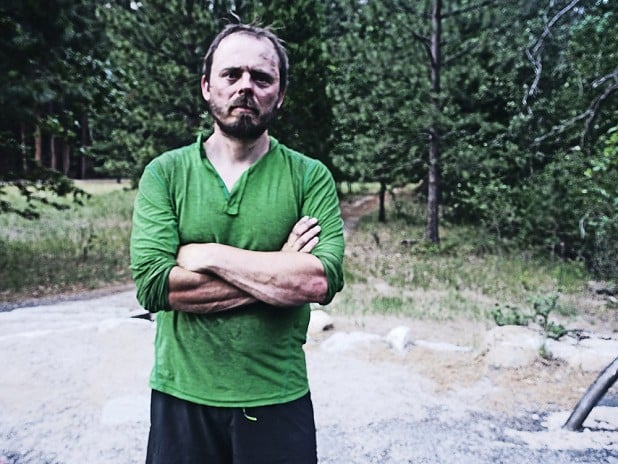
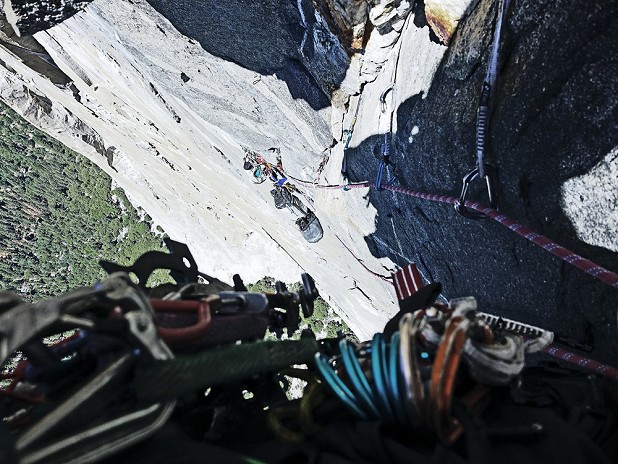
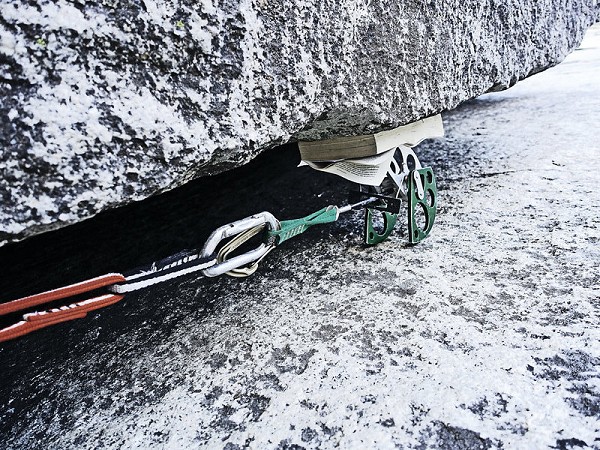
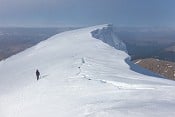
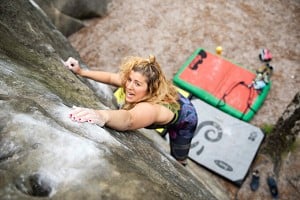
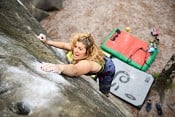
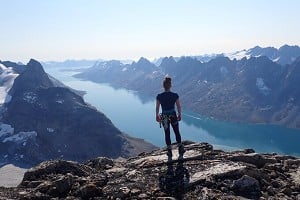
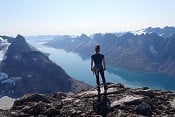


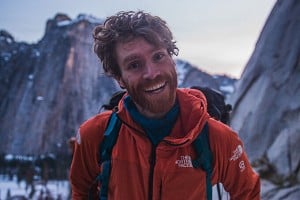
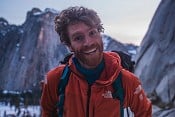




Comments